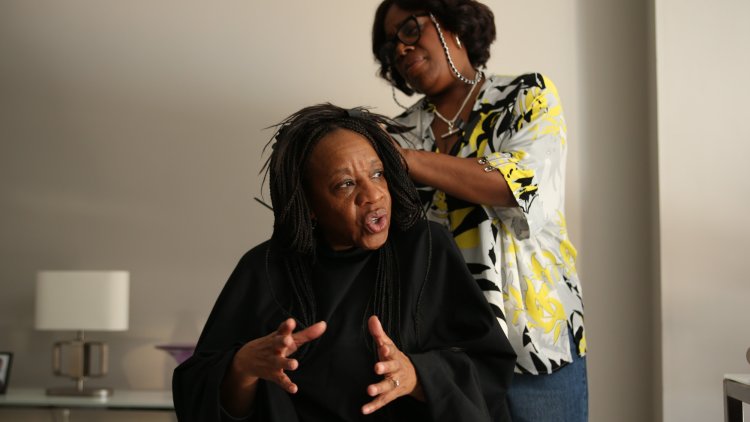A Woman Under the Influence—Of Anger
The new film Hard Truths is an astonishingly sensitive portrait of a perpetual grump.

The fight-or-flight response typically kicks in when a dangerous situation arises. But for Pansy Deacon, the protagonist of the writer-director Mike Leigh’s sublime Hard Truths, self-defense is more of a default mode. Played by the excellent Marianne Jean-Baptiste, Pansy is an intensely bitter London housewife who snaps at strangers, spews criticism toward her family, and fumes constantly. She is in a permanent state of grumpiness.
And yet, Hard Truths itself is astonishingly sensitive for a portrait of someone who often behaves monstrously. Leigh depicts Pansy’s journey with a wrenching empathy, carefully revealing how her irascibility is caused by burdens both specific and mundane. As he follows Pansy across a brief chapter of her life, Leigh doles out hints about her origins, including lingering family traumas that have calcified into resentment. The result is a graceful character study that explores why someone’s capacity for warmth seems to have long been drained.
[Read: The 10 best movies of 2024]
The film doesn’t begin gracefully, however; it presents itself as more of a black comedy at the outset, packed with Pansy’s laugh-out-loud one-liners. At the dinner table with her husband, Curtley (David Webber), and adult son, Moses (Tuwaine Barrett), she monologues about a neighbor’s “fat baby” wearing an outfit she deems unreasonable. “What’s a baby got pockets for?” Pansy complains. “What’s it gonna keep in its pocket?” But Leigh, amid these sequences of Pansy chastising strangers and loved ones alike, guides the viewer to notice what his otherwise hyper-observant lead tends to miss: Curtley seems pained to be holding his tongue, Moses rolls his eyes at his mother’s comments, and her sister, Chantelle (Michele Austin), cheerfully tries to encourage Pansy to come visit more often, while also glancing at her worriedly. Leigh initially pushes viewers toward seeing Pansy as others do: She’s a crusty curmudgeon, a perpetual Scrooge—a cliché.
Until she’s not. Pansy, like many of Leigh’s other female protagonists—Poppy in Happy-Go-Lucky, Gerri and Mary in Another Year—becomes so real, so complex, that she seems capable of walking off the screen and into the real world by the film’s end. Leigh has a knack for dramatizing the ongoings of ordinary people, in part because he develops his characters alongside his collaborators, building off threadbare scripts and cultivating precise details over months of discussions and rehearsals. And Jean-Baptiste—who last worked with the writer-director in 1996’s Secrets & Lies, for which she scored an Oscar nomination—imbues the role with a particularly effective, lived-in familiarity. When Chantelle asks Pansy why she struggles with being happy, Pansy’s voice breaks as she admits that she doesn’t know. The subtle action hints at the depths of her emotional repression, even as she refuses to interrogate her stubbornness. The smallest scenes, such as one in which Pansy sits silently while her family bustles around her preparing a Mother’s Day brunch, also feel charged and recognizable—never saccharine or heavy-handed, just raw.
[Read: You’re probably complaining the wrong way]
For every barb Pansy hurls at the society she so dislikes, the film provides a glimpse of why she shouldn’t be so resistant to those around her. Chantelle, in particular, extends many simple kindnesses toward her sister that seem to help Pansy chip away at her own volatile exterior. In a largely wordless sequence, Chantelle takes the elevator up to her own flat after checking quickly that Pansy wants to, as usual, take the stairs. She knows that Pansy has an irrational fear of the elevator and that she’ll have to endure many flights to reach her place, but Chantelle doesn’t push Pansy to change. Instead, she gives her sister space to indulge her neuroses.
Pansy—lonely, uptight, frightened, public-enemy-to-all-of-London Pansy—has someone who knows her fully, despite her efforts to shut everyone out. Leigh makes sure to extend that same sense of quiet affirmation to the entire ensemble. Hard Truths is filled with understated but hopeful and lovely visuals: Rays of light streak across Moses’s face through a set of window blinds. A bouquet of flowers rests on Pansy’s pristine kitchen counter. Shortly afterward, she slides her back door open just a few inches to breathe in some fresh air. The dialogue is similarly tender. “I don’t understand you, but I love you,” Chantelle says to her sister after one of Pansy’s outbursts. It’s a line that captures an enduring—and yes, hard—truth about humanity that Pansy would probably scoff at: Even the most disagreeable among us need compassion.
What's Your Reaction?




















